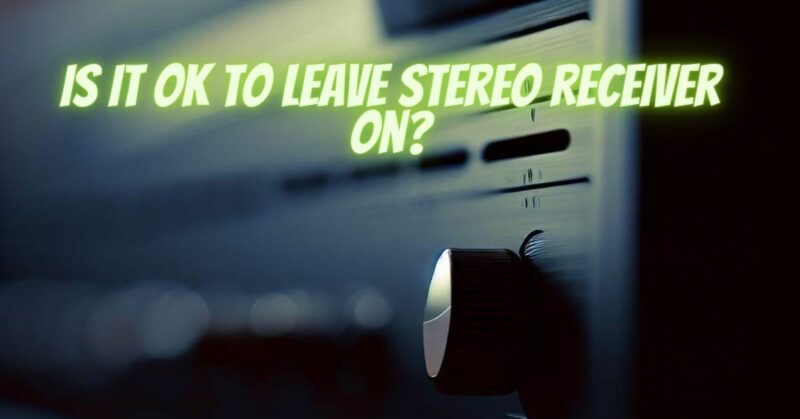The question of whether it is okay to leave a stereo receiver on or turn it off is a common concern among audio enthusiasts. With conflicting opinions and advice, it’s important to understand the potential implications of both approaches. In this article, we will explore the pros and cons of leaving your stereo receiver on and provide guidance to help you make an informed decision.
- Convenience and Quick Access:
One advantage of leaving your stereo receiver on is the convenience and quick access it offers. When the receiver is left on, it remains ready for immediate use. You can simply power on your speakers and start enjoying your audio without the need to wait for the receiver to boot up. This can be particularly beneficial if you frequently listen to music or use your audio system throughout the day.
- Warm-up Time and Sound Quality:
Stereo receivers, especially those equipped with vacuum tube amplifiers, may benefit from a warm-up period. Leaving the receiver powered on allows the tubes to reach their optimal operating temperatures, potentially enhancing sound quality. The warm-up time enables the tubes to stabilize, leading to smoother and more balanced audio reproduction. If you appreciate the nuances of audio quality, leaving your receiver on can provide consistent performance without the need for warm-up time.
- Energy Consumption and Efficiency:
On the flip side, leaving your stereo receiver on continuously can result in higher energy consumption. Even when not in use, the receiver continues to draw power, contributing to your electricity bill. In today’s world, energy efficiency is a growing concern, and consciously reducing unnecessary power consumption is an important consideration. If energy conservation is a priority for you, turning off your receiver when not in use can help minimize your environmental footprint.
- Component Longevity and Wear:
Electronic components, including those found in stereo receivers, undergo a certain level of stress during operation. Leaving your receiver powered on for extended periods can increase the wear and tear on these components. Over time, this can potentially impact the lifespan of the receiver and increase the chances of component failure. If you prioritize the longevity and maintenance of your audio equipment, turning off your receiver when not in use may be a prudent choice.
- Personal Preference and Usage Patterns:
Ultimately, the decision to leave your stereo receiver on or turn it off depends on personal preference and your usage patterns. Consider factors such as how frequently you use your audio system, the warm-up time required for optimal sound quality, energy conservation goals, and the longevity of your equipment. Evaluate these aspects and strike a balance that aligns with your specific needs and priorities.
Conclusion:
Leaving your stereo receiver on or turning it off is a matter of personal preference and practical considerations. While leaving it on provides convenience, quick access, and potential sound quality benefits, it also increases energy consumption and may contribute to component wear. On the other hand, turning it off conserves energy and potentially extends the lifespan of your equipment but requires some wait time for optimal performance. Assess your priorities, consider the pros and cons outlined in this article, and make a decision that best suits your audio needs and lifestyle.


